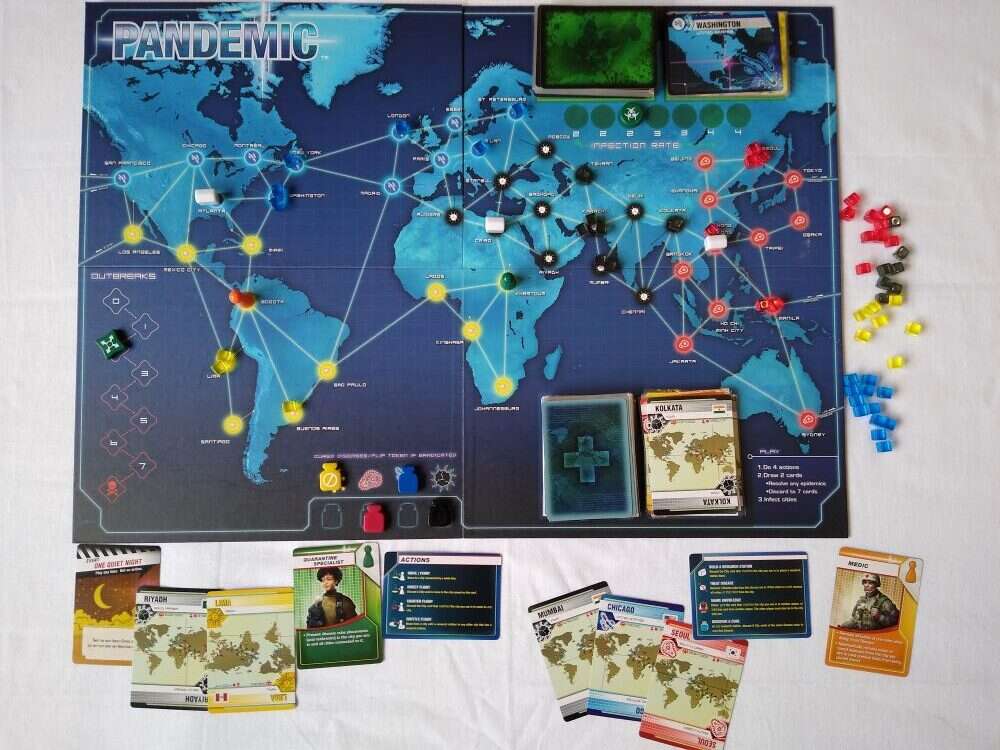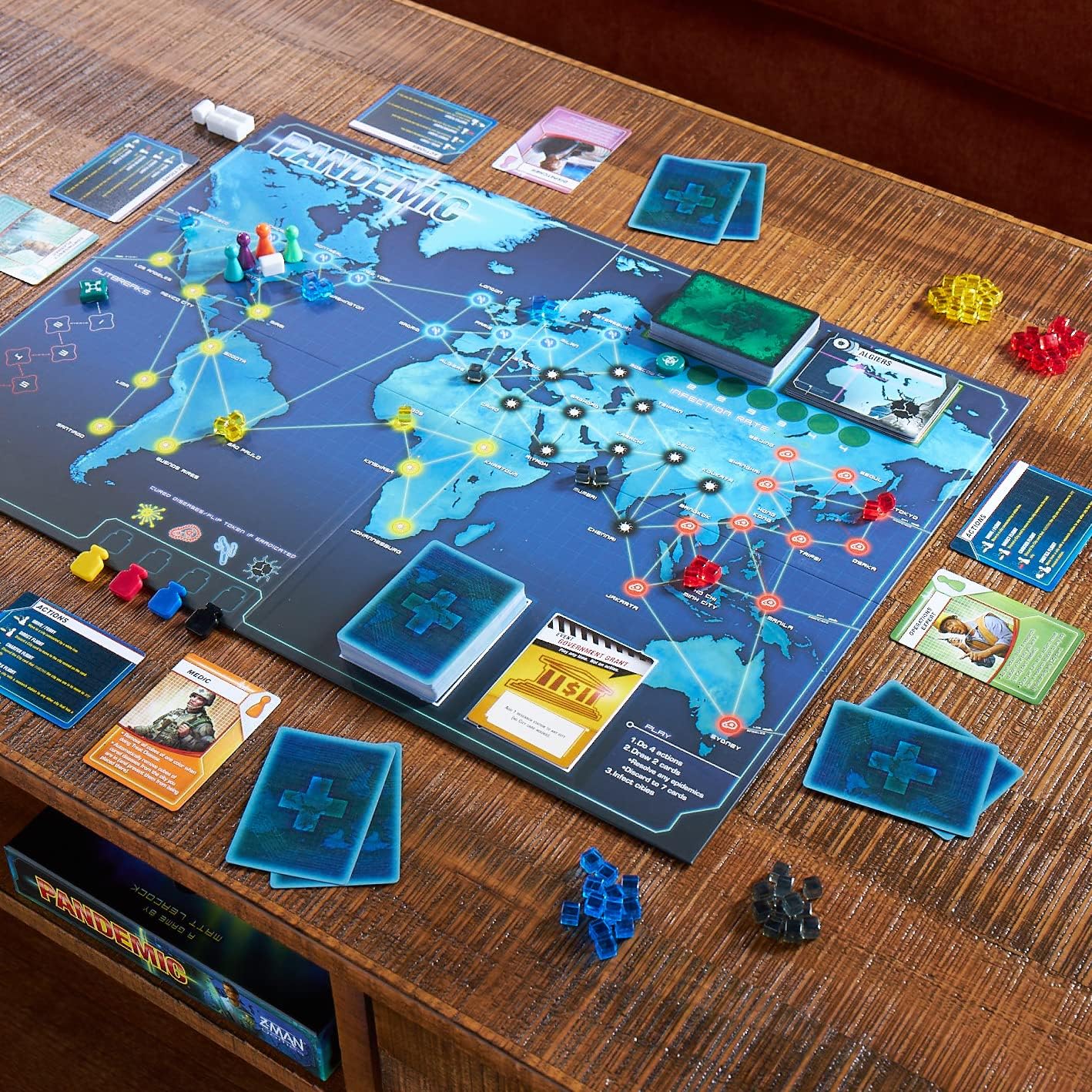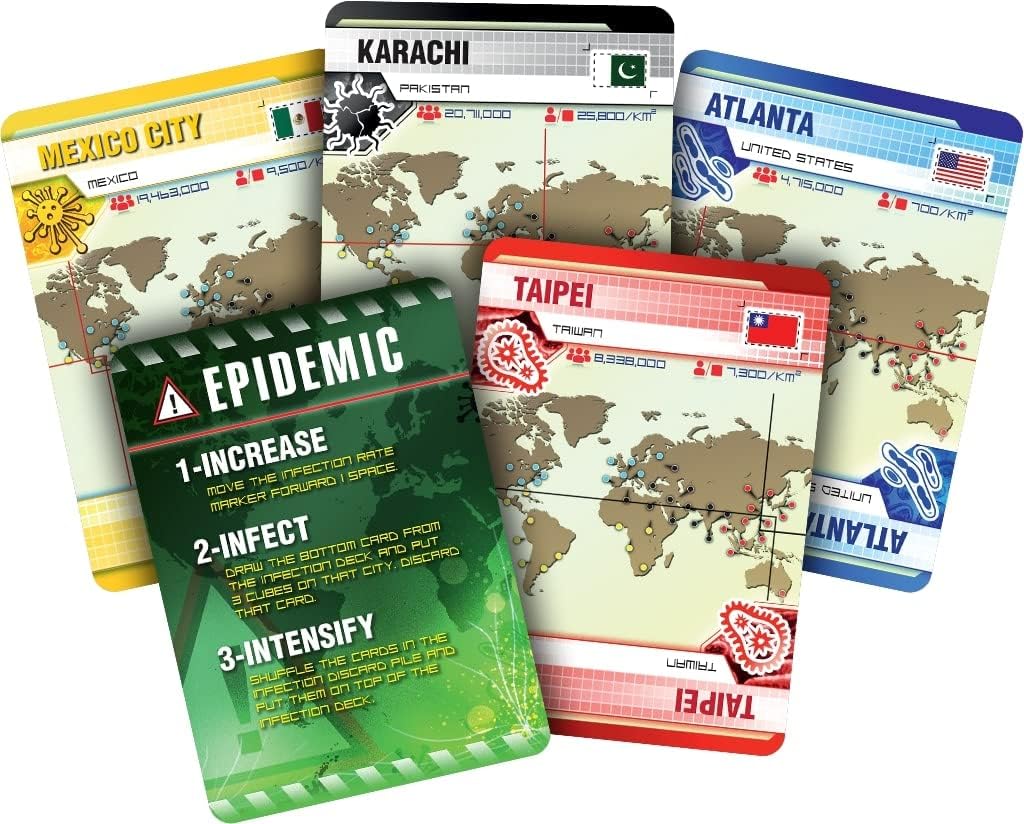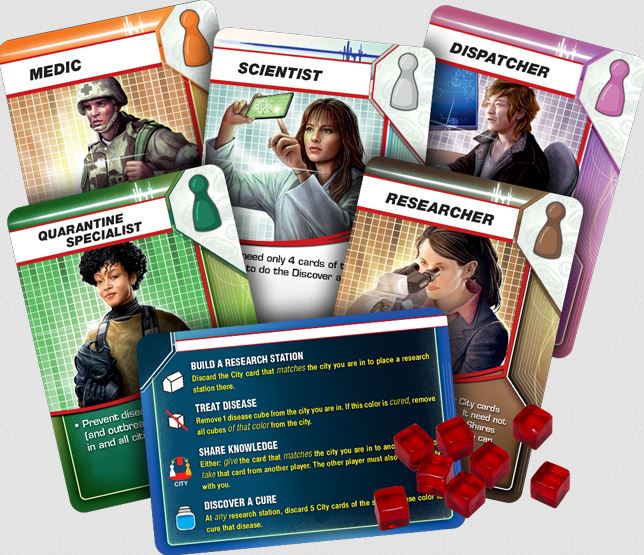In the bleak and desolate world of Pandemic, a creeping terror has engulfed our planet – Relentless and insidious diseases, far more sinister than any nightmare, have unleashed themselves upon humanity and it is the the duty of the players to stop the destruction of civilization as we know it.
As you and your fellow survivors desperately race against time, you confront the horrors of a world unraveling – if you are too slow in dealing with the ever looming threat of the plagues that threaten the very world, the once-vibrant cities will quickly become haunting mausoleums, their streets empty, their buildings stained with the dread of the past.
In this board game, the world is a bleak and unforgiving place, and the only certainty is the ever-present terror of a pandemic that threatens to consume us all.
What’s included in Pandemic?

- Game board representing the world with cities.
- Player pawns representing different roles (e.g., Medic, Scientist).
- Player cards with roles and actions.
- Infection cards that determine where diseases spread.
- City cards representing cities and the ability to cure diseases.
- Disease cubes of different colors.
- Research stations to discover cures.
- Outbreak and cure markers.
- Infection rate and outbreak track markers.
How to play Pandemic

Setup
- Place the game board in the center.
- Put the outbreak marker on the “0” space and infection rate marker on “2.”
- Shuffle the Player cards and deal a role card and a hand of Player cards to each player.
- Place the four cure markers on their respective disease tracks.
- Separate the Infection and City cards into their decks.
- Draw the top six City cards, infect each city with three cubes of its color, and place the cards face-up in the Infection discard pile.
- Draw the top two City cards, infect them with three cubes each, and place them face-up in the Infection discard pile.
- Each player places their pawn in Atlanta (the CDC), the starting city.

Rules for Pandemic
The game is played in turns, with each player taking the following actions in order:
- Player Turn:
- Perform up to four actions. Examples include:
- Drive/Ferry: Move your pawn to an adjacent city.
- Direct Flight: Discard a City card matching your location to move to that city.
- Charter Flight: Discard the City card matching your current city to move to any city on the board.
- Treat Disease: Remove one cube from your current city.
- Build a Research Station: Spend a City card matching your location to build a research station.
- You can also give City cards to other players in the same city.
- Perform up to four actions. Examples include:
- Draw Player Cards:
- Draw two Player cards from the Player deck.
- If you ever have more than seven cards in your hand, you must immediately discard down to seven cards.
- Infect Cities:
- Draw the number of Infection cards indicated by the infection rate marker.
- For each card drawn, add one cube to the city shown on the card. If a city already has three cubes of that color, an outbreak occurs, and cubes spread to adjacent cities.
- Move the infection rate marker one space forward.
- Epidemic Cards:
- If you draw an Epidemic card, follow these steps:
- Increase the infection rate.
- Draw the bottom card from the Infection deck and place three cubes on that city.
- Shuffle the Infection discard pile and place it back on top of the Infection deck.
- If you draw an Epidemic card, follow these steps:
Winning and Losing: You win by discovering cures for all four diseases (collecting five City cards of the same color and spending an action at a research station). You lose if:
- You run out of disease cubes of any color.
- You reach the maximum number of outbreaks.
- You can’t draw enough Player cards.
- The eighth outbreak occurs.
Roles in Pandemic

Here are the roles or characters included in the base game:
- Dispatcher: The Dispatcher can move any pawn to another city on their turn. They can also move other players’ pawns as if they were their own.
- Medic: The Medic has the unique ability to automatically remove all cubes of a cured disease from a city, simply by treating it. This makes them highly efficient at eradicating diseases.
- Scientist: The Scientist needs only four cards of the same color (instead of the usual five) to discover a cure for a disease. This makes them adept at finding cures quickly.
- Researcher: The Researcher can give any City card to another player, even if they are not in the same city. This ability facilitates card sharing and helps in collecting the necessary cards to find cures.
- Operations Expert: The Operations Expert can build a research station in their current city without needing to spend a City card. This ability aids in establishing research stations efficiently.
- Contingency Planner: The Contingency Planner can, as an action, take an Event card from the discard pile and place it on their role card to use later. This allows for strategic use of powerful Event cards.
These roles provide a variety of abilities and strategies for players to use in their quest to stop the spread of diseases and discover cures in “Pandemic.” Additional roles are introduced in various expansions, adding even more depth and variety to the gameplay.
For the official rules, see the link below:
How to win Pandemic
- Understand the Roles: Each player in “Pandemic” takes on a specific role, and each role has unique abilities. Understanding your role and those of your teammates is crucial. Coordinate your actions to make the most of your roles’ strengths.
- Share Information: The game revolves around collecting sets of cards to discover cures for diseases. Share information freely among team members, as this helps in collecting necessary cards and planning efficient cures.
- Prioritize Hotspots: Pay attention to cities with multiple disease cubes (hotspots) and focus on treating or curing those diseases first. Preventing outbreaks is essential, as multiple outbreaks can lead to a loss.
- Balance Outbreaks and Cures: Striking the right balance between treating diseases and working towards cures is essential. In the early game, focus on containing outbreaks, while in the later game, work on finding cures.
- Efficient Card Management: Use your cards wisely. Save cards of the same color for curing diseases, and discard cards that aren’t immediately useful to make room for important cards. Consider using the Researcher’s ability to share cards more efficiently.
- Plan Ahead: Discuss long-term strategies with your team. Decide who will focus on curing diseases, who will treat infections, and who will set up research stations. Planning ahead is crucial to avoid running out of time.
- Coordinate Movements: Coordinate your movements to minimize travel time between cities. This can help in sharing cards, treating diseases, and setting up research stations more efficiently.
- Use Special Abilities: Make the most of your roles’ special abilities. For example, the Dispatcher can move other players, while the Medic can quickly treat diseases. Use these abilities strategically.
- Contain Early Outbreaks: If an outbreak is imminent in an area with multiple disease cubes, consider using an event card like “One Quiet Night” to prevent it. Preventing outbreaks is a top priority.
- Stay Flexible: Be prepared to adapt your strategy as the game progresses. New challenges and obstacles will arise, and your team must respond accordingly.
- Manage Epidemics: When you draw an epidemic card, follow the steps carefully. Intensify the disease by moving the infection rate marker, then infect a city with a new cube. Afterward, shuffle the discarded infection cards and place them back on top of the infection deck. Be ready to deal with the cities that will likely outbreak soon.
- Timing is Key: Try to time the discovery of cures strategically. Don’t rush to find cures before you’re prepared. It’s often better to have all the cards ready and find cures in a single turn.
Remember that “Pandemic” is a challenging game, and losses can be part of the experience. Learn from your mistakes, communicate effectively with your team, and adapt your strategies for future games. Victory in “Pandemic” often comes through collaboration and careful planning.